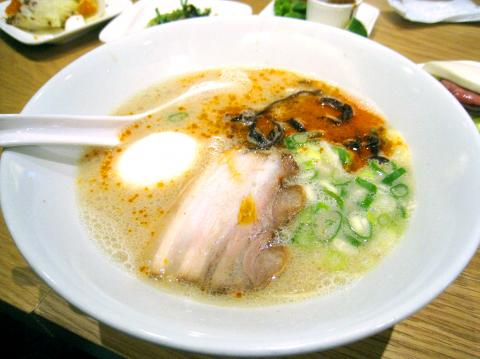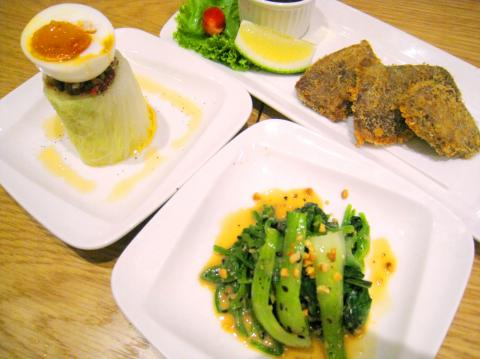Ippudo has earned cult status as the restaurant that brought Japanese Kyushu-style ramen into the mainstream after founder Shigemi Kawahara was crowned “ramen king” following three consecutive victories in a popular Japanese TV ramen competition. From a restaurant seating just 10 in Kawahara’s native Fukuoka, Ippudo has become an international operation with outlets in New York, Hong Kong and Singapore (as well as more than 50 outlets across Japan). It opened its first Taiwan branch last week, and for those willing to endure the hour-long wait for a table (reservations are not accepted), Ippudo proved that it has once again hit the nail on the head for connoisseurs of ramen.
The interior is carefully designed to present an impression of modern style and a degree of chic, but without providing any comforts beyond what is strictly necessary. You look around, are impressed by the clean lines and bold primary colors, then you could easily forget about the space. If this is intentional, it is an impressive feat that puts the focus on the food. Like the decor, this too is deceptively simple. Apart from side dishes, there are only three options for the main course, all of them ramen, each with slightly different flavorings.
That said, these bowls of ramen are no simple proposition. Many restaurant critics here and abroad have already raved about the complexity of the broth, which uses whole pig heads, among other ingredients, simmered over many hours to achieve a luscious texture and multi-layered flavor. The effect is not easy to describe, and this reviewer found himself taking spoonful after spoonful, trying to get his brain around the outstanding qualities of broth, and its sophisticated inter-relationship with the noodles and condiments.

Photo1: Ian Bartholomew, Taipei Times
The three types of ramen on offer are shiromaru classic (NT$200), akamaru modern (NT$230) and Ippudo karaka (NT$230). It is a symbol of Ippudo’s influence in the world of ramen that the designations of “shiromaru” and “akamaru” (white broth and red broth, respectively), initiated by Kawahara, have been adopted by ramen restaurants across Japan. Shiromaru is the basic pork stock, while the akamaru has been enhanced by an infusion of fragrant oil and spicy miso. Karaka, which adds a spiced meat sauce, takes the ramen to a whole new dimension. Ippudo uses ultra-thin hakata-style noodles that can be served either cooked ultra al dente, regular or soft, the last a rather inauthentic option designed to appeal to the Taiwanese preference for soft noodles. Ultra al-dente allows the noodles to give full expression to their ingredients, but like authentic risotto, can taste undercooked if you are not prepared for the firm texture.
As the hakata noodles get soft relatively easily when immersed in stock, the servings of noodles are relatively small, but the restaurant provides additional helpings free of charge for big eaters (or for those who cannot bear to waste even a drop of the delicious broth). Having tried all three styles of broth, this reviewer recommends starting with the shiromaru, as this provides an excellent base note from which to appreciate the more highly flavored varieties; shiromaru, like a fine white wine, may be less powerful than the others, but it has a degree of refinement that to some palates will make it win out against the rest.
The side dishes are interesting, but did not have quite the same level of refinement as the noodles. The Chinese cabbage with soft-boiled egg (NT$55) was perhaps the most sophisticated option, but on the occasion I tasted the dish, the egg was not quite soft enough, the yoke already congealed and therefore unable to flow down into and flavor the tight-packed cylinder of cabbage beneath. It still tasted good, but didn’t have the theatrical quality that one expected from the dish. The deep-fried beef tongue (NT$140) was interesting, but the portion was a bit measly and the presentation a little too much reminiscent of a diner.

Photo: Ian Bartholomew, Taipei Times
Other side dishes such as spicy tofu in hot stone pot (NT$120) and vegetarian noodle salad (NT$200) reach out to a wider clientele, and all are attractively presented and quite tasty. But in the end, the only reason to endure the long queues outside Ippudo is the ramen noodles, and these make any amount of waiting worthwhile.

The canonical shot of an East Asian city is a night skyline studded with towering apartment and office buildings, bright with neon and plastic signage, a landscape of energy and modernity. Another classic image is the same city seen from above, in which identical apartment towers march across the city, spilling out over nearby geography, like stylized soldiers colonizing new territory in a board game. Densely populated dynamic conurbations of money, technological innovation and convenience, it is hard to see the cities of East Asia as what they truly are: necropolises. Why is this? The East Asian development model, with

June 16 to June 22 The following flyer appeared on the streets of Hsinchu on June 12, 1895: “Taipei has already fallen to the Japanese barbarians, who have brought great misery to our land and people. We heard that the Japanese occupiers will tax our gardens, our houses, our bodies, and even our chickens, dogs, cows and pigs. They wear their hair wild, carve their teeth, tattoo their foreheads, wear strange clothes and speak a strange language. How can we be ruled by such people?” Posted by civilian militia leader Wu Tang-hsing (吳湯興), it was a call to arms to retake

This is a deeply unsettling period in Taiwan. Uncertainties are everywhere while everyone waits for a small army of other shoes to drop on nearly every front. During challenging times, interesting political changes can happen, yet all three major political parties are beset with scandals, strife and self-inflicted wounds. As the ruling party, the Democratic Progressive Party (DPP) is held accountable for not only the challenges to the party, but also the nation. Taiwan is geopolitically and economically under threat. Domestically, the administration is under siege by the opposition-controlled legislature and growing discontent with what opponents characterize as arrogant, autocratic

Desperate dads meet in car parks to exchange packets; exhausted parents slip it into their kids’ drinks; families wait months for prescriptions buy it “off label.” But is it worth the risk? “The first time I gave him a gummy, I thought, ‘Oh my God, have I killed him?’ He just passed out in front of the TV. That never happens.” Jen remembers giving her son, David, six, melatonin to help him sleep. She got them from a friend, a pediatrician who gave them to her own child. “It was sort of hilarious. She had half a tub of gummies,